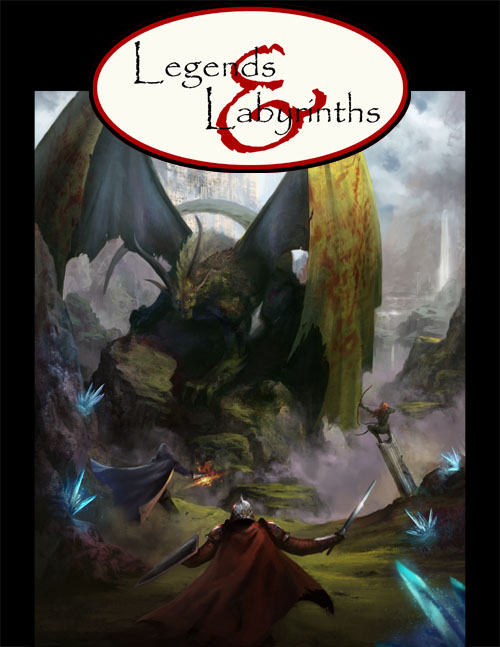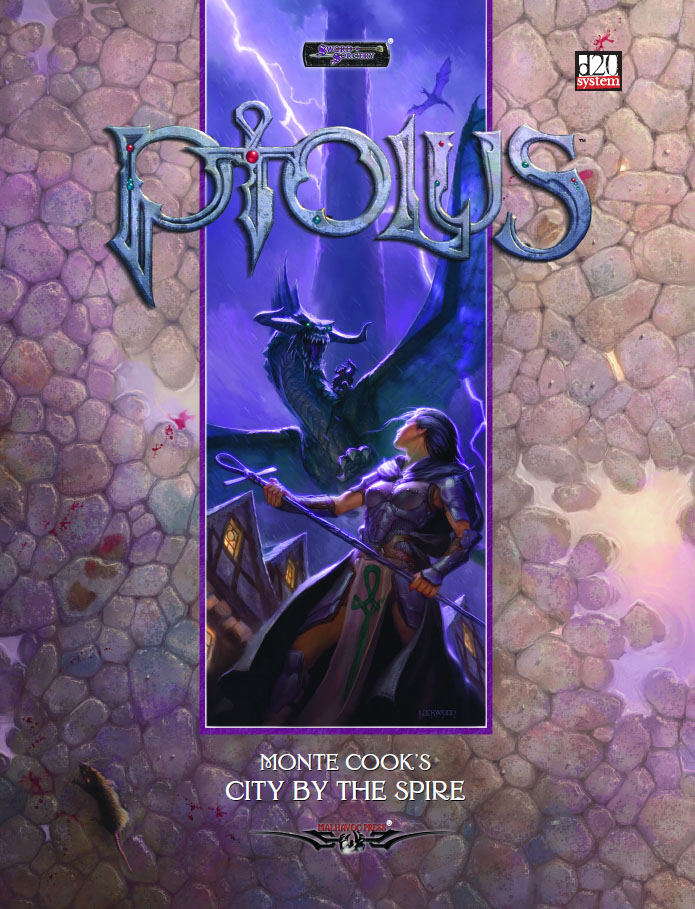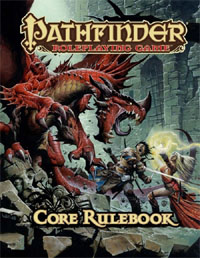Go to Part 1
IMPROVISATION
One thing that I should perhaps make explicitly clear here is that, generally speaking, the only thing I’m prepping is the actual information itself (and that’s assuming I anticipated that the PCs would be interested in researching a particular topic). Everything else — the approach, the key moment, the specific contextualization of the information – is being improvised.
Like all forms of improvisation, of course, coming up with this stuff on-the-fly is a skill which can be learned, practiced, and perfected. It helps that the entire technique I’m describing here is not only an effective technique for narrating the outcome of gathering information, it’s also a very effective method of improvising that content (moving from the general to the more specific).
Improvising Approaches: The biggest improvement you can make in terms of improvising approaches is to do some research into how information gathering can be done. This can be very genre/setting-dependent, but studying real-world tradecraft for spies and detectives can be useful. For RPG specific resources, check out:
- Night’s Black Agents, which
 includes a fantastic section summarizing game-oriented approaches to gleaning information
includes a fantastic section summarizing game-oriented approaches to gleaning information
- Spookshow, a somewhat obscure RPG in which you play a ghost recruited by the government to work as a spy (and also includes an absolutely fabulous discussion of real world spy techniques)
- GURPS Espionage, specifically its detailed tradecraft section
But the other thing you can do is work backwards from the source: Look at the information you need to impart, think about how/where that information can be found, and then create the appropriate approach that will get you to that information.
Alternatively, look at the special abilities a character has and extrapolate unique ways they might use them to gain information: A druid who can speak with the rats of the city. Superman flies high into the air and eavesdrops with super-hearing. A luck dragon closes his eyes and follows his heart. Et cetera.
Improvising Key Moments: At a basic level, improvising the key moment flows pretty naturally out of the approach. You look at what sources of information the approach would be likely to find, and then you create a specific instance of such.
If you find it difficult to improvise this stuff off the cuff, though, there’s ways you can cheat through smart prep. A fairly generic way of accomplishing this is to prep two or three contacts for each PC. (Or have the players prep them for you.) You don’t need a lot here: Just a name and one sentence describing them. Something like, “One-Eyed Pete: Grit addict that the PC used to sail with on the Abandoned Mermaid.” Regardless of what information they’re looking for, you can just reach for the most likely (or, for greater interest, the most improbable) contact they have and figure out how they would know (or could point them towards) that information.
Depending on the nature of the campaign you might find something other than the PCs themselves to hang this prep off of. For example, in an urban campaign you might create two or three contracts per district and use them appropriately.
This sort of thing can also be genre-dependent: In a Trail of Cthulhu game, for example, you might prep a set of evocative Mythos tomes that you can slot information into as necessary. In Eclipse Phase you might want to come up with a list of reputation subnets. For Delta Green maybe you just need a list of cool code names for old operations.
On that note, also look for opportunities to reincorporate sources of information that have already been tapped: That’s basically what H.P. Lovecraft and Robert E. Howard did with the Necronomicon and Nameless Cults, respectively, lending those fictional tomes a weight and meaning that would be absent if they had instead elected to use a different tome every time. (On the other hand, notice how the Mythos benefits from having BOTH the Necronomicon and Nameless Cults, each with a unique history and slightly different connotation for the knowledge it contains. And it can become kitschy if every single obscure fact just happens to be in the same book. So there’s a balancing act.) The same principles apply to NPC contacts, darknet bulletin boards, or any other source of information, allowing your players (and their PCs) to develop long-term relationships and associations with these elements of the campaign (which will, of course, often elevate them to a level importance above and beyond merely being a receptacle for data drops).
Improvising Contextualization: The specific contextualization of the information the PCs are seeking is so specific to the information and the key moment you’ve created that it’s really difficult to cheat that specific moment of creativity. But there are a few things to keep in mind:
- How do they know the information
- What’s their opinion of the information
- What’s their motivation for giving the information
- What’s their relationship to the information (and to the PCs)
(Note that most of these can apply to both people and inanimate sources of intel.)
Prepping It All: “What if I just prep all of this stuff in advance?” If you’re a new GM and you’re really struggling, this can be an option. But I generally advise against it because it becomes a trap: You’re not practicing your improvisational skills, so you’re not getting any better at it. And the prep is fragile (leading to lots of wasted prep) because it can be so trivially disrupted by the players choosing an incompatible approach. (You prep One-Eyed Pete, for example, but the players decided to hit up the newssheet archives at the Old Library looking for information on the Vladaams instead.)
You’ll generally be better off prepping the tools that make your improv better rather than that trying to avoid improv entirely. At least in my experience.
TIERED INFORMATION
One last thing to briefly consider here are research and canvassing tests that can gain multiple pieces of information, particularly those checks where the information is tiered (so that better results yield more difficult or detailed intel).
Here’s a typical example of a tiered Gather Information check from D&D:
DC 10: The Republicans are a fringe political group. They want independence for Ptolus or something like that.
DC 12: The Republicans specifically want to abolish the mercantile system of government and replace it with a “deot for all”, with the Trade Circle being popularly elected. As part of this effort, they desire independence from the central authority of Salesia and the Merchant Council.
DC 15: The Republicans have been more active of a late. They’ve delivered several petitions to the Commissar and have been organizing small rallies here and there throughout the city.
DC 18: No one’s sure how the Republicans are organized, if they are. Recently their public face has been Helmut Itlestein – he’s appeared at several rallies as a speaker, issued petitions, and the like.
DC 30: It’s said that the Republican movement is, in fact, secretly run by an organization known as the Knights of Enlightenment. Nobody seems to know much of anything about the Knights of Enlightenment. In fact, the name means absolutely nothing to pretty much everyone you talk to.
When constructing a tier of information like this it’s important that the information actually is tiered. I’ve seen a number of published adventures where they have five or six bullet points worth of information they want to convey, so they just string them onto an escalating DC table, resulting in nonsensical things like a telephone directory look-up requiring a DC 40 test or the like.
An alternative approach here is to randomly choose X pieces of information from a list of available results on a successful test. When using this approach, however, I think it’s important to communicate that if they spend more time — i.e., make additional checks — there’s more information for them to find. This can be very effective in handling the rumor table for a location or region, for example.
In either case, when you have many different pieces of information which can be obtained, you need to figure out whether you want to have one key moment or several different key moments. In doing so, you need to primarily consider two factors:
- The drag on pace created by framing multiple key moments; vs.
- The potentially increased interest created by multiple key moments
There’s no “right answer” to this. You’re going to have to gauge your player’s interest and engagement with the information being sought; the overall pace of the scenario; and the amount of interest you feel the players will have in interacting with the key moments.
If I have any rules of thumb to offer here, it’s that:
- The more interactive the key moment is, the more likely the players are to sustain interest through several of them (as opposed to listening to the GM drone through flat narration).
- If the group split up to find the information, giving everyone a different chunk of the information custom-tailored to the approach they take is generally well-received.
- Players are generally more interested if there’s a clear build to the information they’re receiving (so multiple key moments can work better with tiered information than with an undifferentiated exposition dump).
- Handouts are a great way of mixing up information delivery.
On the other hand, big exposition dumps aren’t really the most interesting way to convey information. So in your prep, you may want to look at other ways of structuring this information into your scenario than through a single skill check. (Framing heists is one way of doing that, although obviously that’s a technique which can also be overused. You may also want to check out Getting the Players to Care.)
Something else you can experiment with here is to actually ditch all of the advice I’ve just given you for a bunch of the information and then only frame to key moments for one or two of your bullet points.
For example, if someone rolled a DC 30 success on that Gather Information table above, I might say, “Asking around town you quickly figure out that the Republicans are some kind of fringe political group that want to abolish the mercantile system of government and replace it with a ‘deot for all’, featuring a popularly elected Trade Circle and independence from Salesia.” Then I might hand them a list of recent and upcoming rallies along with a flyer featuring a speech by Helmut Itlestein, and then frame to a scene where they chat with the Commissar’s personal assistant who can reveal the rumors that they’re being secretly run by the Knights of Enlightenment.
NEXT: Perception-Type Tests




















